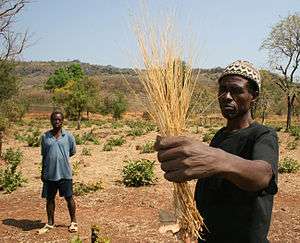Fonio
Fonio is the term for two cultivated grasses in the genus Digitaria that are notable crops in parts of West Africa.[1] They are millets with small grains.[1]

Fonio is a nutritious food with a favorable taste.[1][2] It is consumed mainly in West African countries, where it is also cultivated.[1][2] The global fonio market was 673,000 tonnes in 2016.[3] The name fonio (borrowed by English from French) is from Wolof foño.[4]
In December 2018, the European Commission approved commercialization of fonio as a novel food in the European Union, after submission by the Italian company Obà Food to manufacture and market new food products.[5][6]

.jpg)
Types
White fonio
White fonio, Digitaria exilis, also called "hungry rice" by European colonisers because they observed its popularity among West Africans, is the most common of a diverse group of wild and domesticated Digitaria species that are harvested in the savannas of West Africa.[1] Fonio has the smallest seeds of all species of millet.[1] It has potential to improve nutrition, boost food security, foster rural development, and support sustainable use of the land.[1]
Nutritious, gluten-free, and high in dietary fiber,[1][2][7] fonio is one of the world's fastest-growing cereals, reaching maturity in as little as six to eight weeks.[1] The grains are used to make porridge, couscous, bread, and beer.[1]
Biotechnology
Beginning early in the 21st century, fonio was under development in biotechnology to enhance African food security by improving its grain size, culms, yield, and resistance to insect pests and diseases.[8]
Cultivation and processing
Fonio grows in dry climates without irrigation, and is unlikely to be a successful crop in humid regions.[1] It is planted in light (sandy to stony) soils, and will grow in poor soil.[9] The growth cycle ranges from 70-130 days, depending on variety.[10] Fonio has C4 carbon fixation, as for other grasses. They are medium in height.[11] The ploidy level for the species range from diploid (2n), tetraploid (4n), to hexaploid (6n).[12]
Fonio is labor intensive to harvest and process. Men and boys use sickles to cut down the fonio, which women then gather into sheaves and set out to dry.[13] Then it is threshed by spreading it on straw mats or tarps, typically by women using their feet. The grains are then washed by hand.[7]
The small grains make it difficult and time-consuming to remove the husk.[1] Traditional methods include pounding it in a mortar with sand, and then separating the grains and sand,[14] or "popping" it over a flame and then pounding it, which yields a toasted-color grain (a technique used among the Akposso).[1] The invention of a simple fonio husking machine offers an easier mechanical way to dehusk.[15]
See also
- Teff, another African grass crop seed
- Digitaria compacta, raishan, used as a grain crop in northeast India
- Digitaria sanguinalis, considered a weed around the world, but traditionally used as a grain crop in Europe
References
- "Fonio (Acha)". In: Lost Crops of Africa: Volume I: Grains, Chapter 3, US National Academies Press. 1996. Retrieved 22 December 2019.
- Jessica Levinson (1 September 2018). "Whole grains: Fonio". Today's Dietitian. Retrieved 22 December 2019.
- Sergey Avramenko (3 May 2018). "Guinea Is the Largest Producing Country of Fonio". IndexBox. Retrieved 22 August 2018.
- Christian Seignobos and Henry Tourneux, Le Nord-Cameroun à travers ses mots: Dictionnaire de termes anciens et modernes: Province de l'extrême-nord (Karthala Editions, 2002; ISBN 2845862458), p. 107.
- "Fonio: EU Novel Food Approval". Official Journal of the European Union. European Commission. 18 December 2018.
- Niamh Michail (18 June 2018). "Italian firm Obà brings Fonio to Europe". Foodnavigator.com. Retrieved 22 December 2019.
- Heil, Emily (17 December 2019). "Is fonio the new quinoa? One chef hopes the tiny West African grain will be". Washington Post. Retrieved 21 December 2019.
- Kuta, Danladi Dada; Kwon-Ndung, Emmanuel; Dachi, Stephen; Ukwungwu, Mark; Imolehin, Emmanuel Dada (December 2003). "Potential role of biotechnology tools for genetic improvement of "lost crops of Africa": the case of fonio (Digitaria exilis and Digitaria iburua)". African Journal of Biotechnology. 2 (12): 580–585. ISSN 1684-5315.
- "Cultivation / The plant - Fonio (Digitaria exilis)". fonio.cirad.fr. 2019. Retrieved 22 December 2019.
- "The plant - Fonio (Digitaria exilis)". fonio.cirad.fr. 2019. Retrieved 22 December 2019.
- Haq, N (1995). Fonio (Digitaria exilis and Digitaria iburua). London: Chapman & Hall. pp. 2–6.
- Adoukonou-Sagbadja, H.; Schubert, V.; Dansi, A.; Jovtchev, G.; Meister, A.; Pistrick, K.; Akpagana, K.; Friedt, W. (2 July 2007). "Flow cytometric analysis reveals different nuclear DNA contents in cultivated Fonio (Digitaria spp.) and some wild relatives from West-Africa". Plant Systematics and Evolution. 267 (1–4): 163–176. doi:10.1007/s00606-007-0552-z. ISSN 0378-2697.
- "Postharvest technologies - Fonio (Digitaria exilis)". fonio.cirad.fr. Retrieved 22 December 2019.
- "Traditional processing / Postharvest technologies - Fonio (Digitaria exilis)". fonio.cirad.fr. 2019. Retrieved 22 December 2019.
- "Postharvest mechanization / Processing - Fonio (Digitaria exilis)". fonio.cirad.fr. 2019. Retrieved 22 December 2019.
Further reading
- "Fonio: an African cereal crop". CIRAD. Archived from the original on 13 October 2005. Retrieved 10 January 2006.
- Portères, R. (1976). "African cereals: eleusine, fonio, black fonio, teff, Brachiaria, Paspalum, Pennisetum and African rice". In Harlan, J.R.; De Wet, J.M.J.; Stemler, A.B.L. (eds.). Origins of African plant domestication. The Hague: Mouton. pp. 409–452.